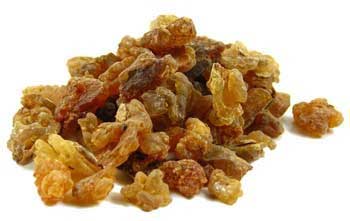Product Safety: Myrrh
Myrrh Precautions & Warnings:
Pregnancy and breast-feeding: Taking myrrh by mouth during pregnancy is UNSAFE and should be avoided. Myrrh can stimulate the uterus and might cause a miscarriage. There isn’t enough information to rate the safety of using myrrh on the skin during pregnancy, so until more is known, it’s best to avoid this use.
Breast-feeding mothers should also avoid using myrrh. Not enough is known about the safety of using myrrh when breast-feeding.
Diabetes: Myrrh might lower blood sugar. There is a concern that if it is used along with medications that lower blood sugar, blood sugar might drop too low. If you use myrrh as well as medications for diabetes, monitor your blood sugar carefully.
Fever: Myrrh might make a fever worse. Use with caution.
Heart problems: Large amounts of myrrh can affect heart rate. If you have a heart condition, get your healthcare provider’s advice before starting myrrh.
Surgery: Since myrrh might affect blood glucose levels, there is a concern that it might interfere with blood glucose control during and after surgery. Stop using myrrh at least 2 weeks before a scheduled surgery.
Systemic inflammation: If you have systemic inflammation, use myrrh with caution, since it might make this condition worse.
Uterine bleeding: Myrrh seems to be able to stimulate uterine bleeding, which is why some women use it to start their menstrual periods. If you have a uterine bleeding condition, use myrrh with caution, since it might make this condition worse.

Myrrh Interactions: MODERATE CAUTION
-
Medications for diabetes (Antidiabetes drugs) interacts with MYRRH
Myrrh might decrease blood sugar. Diabetes medications are also used to lower blood sugar. Taking myrrh along with diabetes medications might cause your blood sugar to go too low. Monitor your blood sugar closely. The dose of your diabetes medication might need to be changed.<br><nb>Some medications used for diabetes include glimepiride (Amaryl), glyburide (DiaBeta, Glynase PresTab, Micronase), insulin, pioglitazone (Actos), rosiglitazone (Avandia), chlorpropamide (Diabinese), glipizide (Glucotrol), tolbutamide (Orinase), and others.
-
Warfarin (Coumadin) interacts with MYRRH
Warfarin (Coumadin) is used to slow blood clotting. Taking myrrh might decrease how well warfarin (Coumadin) works to slow blood clotting. This could increase the chance of blood clotting.

